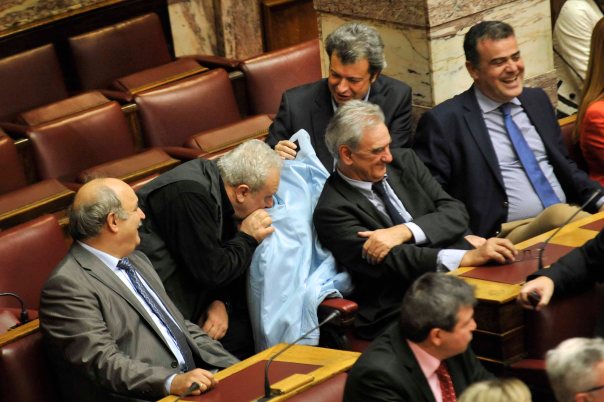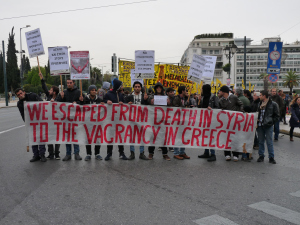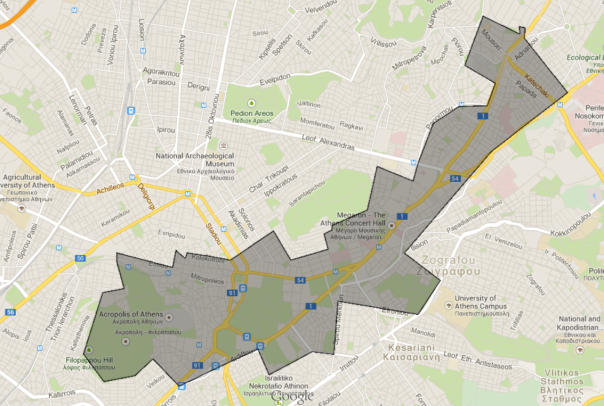
Syrian refugees prepare for their 19th night sleeping out on Syntagma Square in central Athens (Photo: @NickBarnets/Twitter)
Europe’s human rights court is expected to issue a decision early this week on an emergency case taken on behalf of some of the hundreds of Syrian refugees who have been camped out in central Athens to highlight their plight for almost three weeks.
The Syrians, among them many unaccompanied minors, families with young children and elderly, last night completed their 19th night camped out on Syntagma Square, with only rudimentary plastic sheeting to protect them from the rain and low temperatures.
They took the decision to protest in front of the Greek parliament on November 19, in an attempt to convince the government to find a solution to their acute problems. Since then, some of the protesters embarked on a hunger strike.
The application to the European Court of Human Rights (ECtHR), taken in the name of 30 Syrians, maintains that the refugees, who risked their lives in fleeing their war-torn country and in reaching Greece, should have been given automatic protection upon their arrival in Greece, according to national, European and international standards. This would also mean that they be afforded reception conditions in terms of housing, food and other support.
The decision from the Strasbourg-based court could come as soon as Monday or Tuesday, according to human rights lawyer Electra Leda Koutra, who submitted the case under the court’s rule 39 on interim measures, which are urgent measures that apply only where there is an imminent risk of irreparable harm.
Among the 30 Syrians seeking the interim measure is a 12-year-old child who is an unaccompanied minor. A “holder of a Syrian passport, he has been left without information, without any kind of support, guardianship or monitoring, on the Greek streets, after having been considered ‘deportable’ to a war zone”, the application states.
Although the child has indicated that he would consider applying for asylum in Greece, he has said this would be conditional on him being promptly reunited with his brother, a recognised refugee, in Sweden. However, any such applications from unaccompanied minors would take at least eight months to process, according to the application to the court.
Although the government has said it could process up to ten applications for refugee status a day, the application to the ECtHR argues that this is a wholly inadequate response to the situation as it envisages offering homeless refugees no accommodation or support in the meantime and would thus leave them to fend for themselves and exposed to racist attacks, among other dangers.
The application also maintains that what Greece is offering to the Syrians in terms of reception conditions should they obtain refugee status is unacceptable under the country’s international obligations. In a leaflet, interior ministry officials told the Syrians that only a few women with small children would be accommodated in a hosting facility, and no subsistence or other support would be possible, “because of the Greek state’s financial crisis”.
“That documents admits in the most public – but also cynical – way that Greece cannot offer the reception conditions guaranteed by the CEAS [Common European Asylum System] on EU ground. No housing, no food, no clothing, no social and integration services are to be automatically offered, despite the opposite legislative guarantees,” Koutra told A Gael in Greece.
She adds that under Greek presidential decree 80/2006, which transposes into national law European Council directive 2001/55, the country may offer temporary protection to refugees without obliging them to apply for asylum. This would require the permission of the European Commission and Council, but Greece would need to propose it.
“This they could not refuse. This could certainly take place concerning the Syrians,” Koutra believes. “Legally, the Syrians have a chance to succeed in what they are asking, even if they don’t know the law. They are members of a large group, have come to Greece thinking it was a safe place. If Greece cannot guarantee them this, it should not obstruct them. If there is a crisis, Greece must admit this and request help.”
As the Strasbourg court has been informed by the lawyer, all the other Syrian applicants named in the case have said they will refuse to apply for asylum in Greece.
The overall situation pushes Syrians into taking unconventional ways to reach safe EU countries, the application points out, putting their lives in great danger in the process. Already, two Syrians who were part of the Syntagma protest have died while attempting to make it to western Europe on foot, including a doctor, Ayman Ghazal. On Monday, one of the Syrian protesters provided A Gael in Greece with the names of four other Syrians who died recently died after leaving Greece in forests of neighbouring countries: Nizar Sourki, who died in Macedonia, and Mohammad Aryan, Ismael Alahmad and Khaled Husain Basha, who died in Albania.
The application points to a series of ECtHR rulings that established that asylum seekers have been left in an extremely vulnerable situation and humiliated in Greece due to the failure by the authorities to act on its obligations under the EU’s reception directive. Other rulings from the court have found that asylum seekers have been subjected to “degrading treatment” in the country’s detention centres. These rulings effectively prohibit a number of EU countries from deporting asylum seekers to Greece.
She has told the court that “Recognising that Greece finds itself in a situation in which it is almost impossible to meet the needs of persons in analogous status … we requested that the Greek Government should at least recognize that fact and let them proceed to other EU countries, in any legal way possible.”
“We are of the view that, accepting to ‘gradually’ apply for asylum at this stage (as protesters), just for the ‘title’ of it, without the rights and benefits escorting the status of an asylum seeker, does not constitute an effective remedy for the applicants, in the meaning of the [European human rights] convention. It would not move them to a position of safety, and it would not redress the rights the applicants are complaining about. Moreover, it would take about two months for all the protesters to be registered, which would mean that, besides their guaranteed rights, they would have to spend winter in the Athenian streets, in a situation that is menacing their lives, bodily and mental integrity –not to mention their dignity as human beings,” she explained to the court.
Koutra hopes that whatever the outcome, the decision from the court will be extremely important. She points out that on November 26, two days after submitting her application, the ECtHR responded promptly and, applying an urgent procedure, requested the Greek government to clarify a number of points regarding the Syrians by December 5.
Firstly, the court asks the government to describe the situation the Syrians find themselves in. Second, to clarify on what measures it envisages for particularly vulnerable Syrians, such as women with young children and unaccompanied minors. Thirdly, it calls on the Greek government to explain how it intends to process asylum applications, and, finally, to explain in what conditions the asylum applicants would be obliged to wait while their applications are being processed.












![guw[1]](https://damomac.files.wordpress.com/2014/12/guw1.png?w=406&h=635)